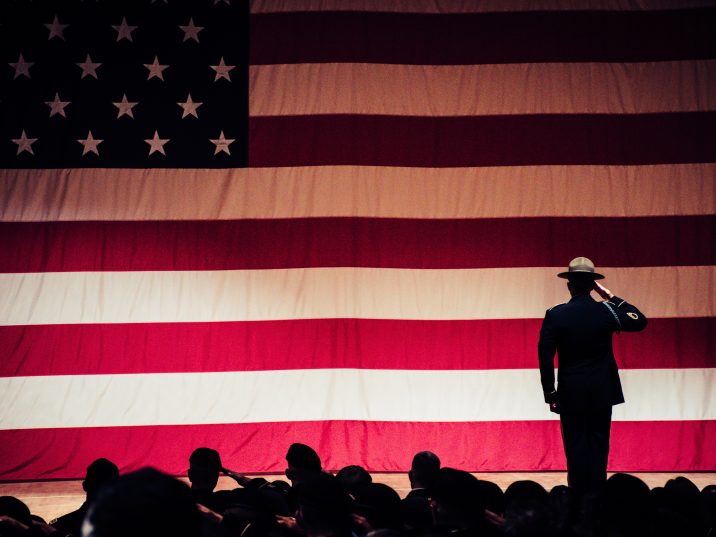Dean Richard Franza’s column appeared in the Sunday, Nov. 7, edition of the Augusta Chronicle. The post can be viewed here.
Nov. 11 is Veterans Day, when we honor those who have served in the United States Armed Forces.
As a proud veteran myself – U.S. Air Force, retired – I am thankful for the way we are now treated in our country. People often thank me and my fellow veterans for our service, and we are often asked to stand and be recognized at sporting events.
These strong, positive feelings for those who wear the uniform are very different from when I first joined Air Force ROTC in college in 1977. The post-Vietnam era was not the best time to be associated with the military, but I am certainly glad to see that our country is now firmly behind our military, particularly in the years following 9/11.
However, while veterans, like other Americans, have benefited from a strong pre-pandemic economy and its robust labor market – which appears to be in full recovery mode now – they are also 37% more likely to be “underemployed,” according to a 2020 study by LinkedIn. Underemployment is defined as when a person engages in work that does not make full use of their skills and abilities.
Unfortunately, the skills and character traits developed in the military are often unknown, ignored or undervalued by the private sector. I think it is time for the private sector to better understand the value that hiring veterans can bring to its organizations and truly thank veterans for their service. However, hiring a veteran will not only demonstrate your appreciation for his or her service but will also result in you retaining an excellent employee who will make your whole team better.
Here are some of the myriad of reasons you should hire a veteran:
Veterans are trainable and coachable. Veterans are often underemployed because companies believe that they do not have the skills or experience to perform the jobs at their company. However, in many cases, commitment and the ability to learn will outweigh experience in the long run. All veterans have been trained in their military careers to do things they had never done before and were often “coached up” to handle new challenges. If you provide a veteran with appropriate training and you are willing to mentor or coach him/her, you will soon have an outstanding, independent performer.
Veterans are loyal and committed to their organizations. Veterans have consistently prioritized organizational success over individual success. Throughout their military careers, veterans have demonstrated their commitment to their unit and their country, and remain loyal no matter the challenges or circumstances. This typically translates to higher retention rates of veterans when they enter the private sector, which is critically important in these times when turnover is high and the cost of replacing workers continues to grow. Recent data show that veterans remain with their initial company 8.3% longer than nonveterans.
Veterans are highly motivated and high achievers. Veterans come from a culture built with mission accomplishment in mind. They have a mentality of “mission first.” Therefore, they come to work motivated to achieve and succeed that comes from having lived that culture throughout their military careers. This typically leads to outstanding results as veterans are 39% more likely to be promoted earlier than nonveterans.
Veterans are outstanding team members, as great leaders and great followers. Everything in the military is accomplished in a team setting with a clear, hierarchical “chain of command.” Veterans are very comfortable being part of a team and following the formal leader of the team. You can depend on veterans to do their part of a team effort. However, in the military, personnel are often provided both formal and informal leadership opportunities. Veterans know how to quickly read a situation and can determine when to be a leader and when to be a follower. Great teams are composed of people who know how to follow but can rise to the occasion when leadership is needed. These are skills that have been developed in veterans.
Veterans are resilient and triumph over adversity. Veterans faced many challenging circumstances during their military careers. They have learned how to deal with adversity and overcome significant difficulties. Their military careers have made them resilient and that carries over to their post-military careers. Their resiliency will not only benefit them in the business world but will also set a good example for their co-workers.
Integrity. For a military unit to operate effectively in stressful situations, integrity in each individual is paramount. Honesty, respect, dependability and commitment are the elements of integrity found in all veterans. These are values we look for in all of our employees and are traits we hope will rub off on their co-workers.
Respect for diversity and inclusion. Veterans have learned to work with individuals regardless of race, gender, religion, ethnic background and economic status. They have experience cooperating with many different types of individuals and respecting the differences of others. Having come from an environment that respects diversity and inclusion, veterans will bring that respect to the workplace and will likely influence others to do the same.
Veterans bring many valuable traits, attributes and skills to your workplace and can share those with others. I hope you will celebrate Veterans Day by thanking a veteran for his or her service with an opportunity in your organization!







